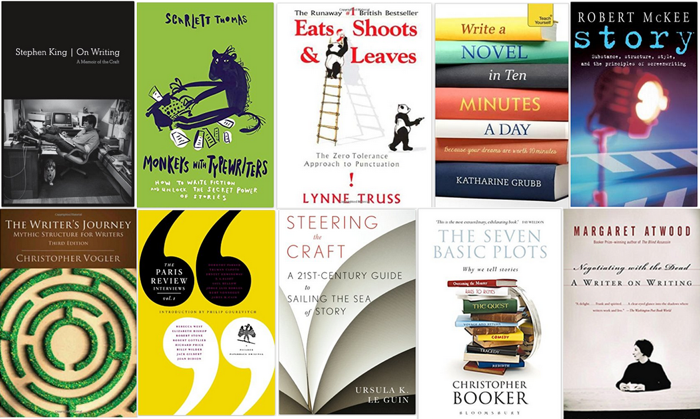10 Ways to Stay in and Write in January
Kirsty McLachlan is a literary agent at DGA Ltd and co-director of London Writers’ Club. Follow them on Twitter at @writersclub.
January is a tough month – but a great time to stay in and write. Kirsty McLachlan offers some tips for making this a productive month for writers.

January is a time for change, for inspiration, for doing something new – but it’s also cold, damp and dreary so staying in and writing is the perfect thing to do (preferably on the sofa). At London Writers’ Club we decided to support our community of writers throughout the month of January by launching our first Stay in and Write month – 31 days of writing ideas, inspiration, writing exercises and inspiring advice from editors, publishers, agents and authors. I’d like to share with you ten of the top ways to Stay in and Write in January here.
1. Write from your heart
Write your first draft with your heart. Re-write with your head. – From the movie Finding Forrester
Write a page – a paragraph – or if you have more time, something longer. Leave it alone to stew and then in the evening, go back to it and see what you’ve written. You may have to throw away 90% of the words or just snip at the corners.
2. Give yourself some treats
The lovely, Jessica Ruston, author of Luxury and To Touch the Stars told us she survived January writing with the following tip:
‘I operate a complex reward system to get me through writing difficult/dull bits; I treat myself like a small child, or pet, in need of constant encouragement and treats. January is too bleak to use the ’stick’ part of the equation.’
3. Do it for love
Write without pay until somebody offers to pay – Mark Twain
When you’re just starting out it’s hard to decide where to begin. So don’t ‘decide’. Just start writing. A blog is a good place to start exercising your writing muscle. You don’t have to have a book deal in mind or have a specific publisher as your target – write to find your voice and your subject and the business stuff can come later.
4. Read out loud
The Shortfire Press was launched this month by publisher Clare Hey. It’s a digital publisher specializing in short story ebooks by emerging and established writers. Clare’s tip for January writing is:
‘When writing dialogue, try reading it out loud. You may feel a bit daft but you’ll notice the way it sounds and pick up any unnaturalness or awkwardness.’
5. Read short stories
One of literary agent David Godwin‘s top tips for writing is to READ. But, ah, it’s tough when you’ve not got much time. What about short stories? The perfect way to discover great writing in short bursts. Some great collections are:
- Angela Carter’s Book of Wayward Girls and Wicked Women
- Willful Creatures by Aimee Bender
- A Winter Book: Selected Stories by Tove Jansson.
6. Write for fifteen minutes a day
Cat Clarke, co-runs, The Lighthouse, a literary consultancy offering services for children’s/YA books. Cat is also a former publisher and now a writer – her book Entangled will be published this month by Quercus. Her writing tip is:
‘Write for fifteen minutes a day. Everyone can find a spare fifteen minutes, and you’ll probably end up writing for longer! Little and often is the key for me.’
7. Be reachable
Be reachable and set up a very small one page website – it will take you an hour tops and just means you are out there. Your site should include the following: your name, your contact details and any other relevant details such as previous writing experience, or expertise in your subject if you are writing non fiction.
8. Write one day at a time
Matt Whyman is a writer of both adult and children’s books. His new book Oink! My Life with Minipigs will be published in February. His top tip for January is:
‘Don’t look at the month ahead and wonder whether you’ll manage. Focus on one day at a time. It’s a method that works when it comes to post-Christmas detoxing, and just as effective for getting a story written.’
9. Ignore your inner demons
Gail Godwin is the author of over fifteen books and has recently published two volumes of her memoirs entitled The Making of a Writer. We all have our inner demons or critics who tell us our writing is no good, so take some tips from Gail on how to deal with our ‘Watchers’:
‘Look for situations when he’s likely to be off-guard. Write too fast for him, in an unexpected place, in an unexpected time. Write when very tired. Write in purple ink on the back of a Mastercard statement. Write whatever comes into your mind when the kettle is boiling and make the steamwhistle your deadline.’
10. Don’t give up, be persistent
You can’t try to do things, you must simply do them – Ray Bradbury
It took short story writer Ray Bradbury years before he reached a level in his writing he thought was good – remember you are a writer every time you write, but sometimes it takes persistence and a lot of drafts before you are a great writer.
January is not the time for drastic diets and tough exercise regimes, nor is it time as a writer to try and set unrealistic challenges or timeframes. Remember to be gentle on yourselves and keep to the ‘little and often’ rule. SIAW is completely free and there is still time to sign up for the daily ezines through the sign up box on the London Writers’ Club website. For lessons on your sofa, our fiction teleclass kicks off on Monday.
 What are your top tips for staying in and writing in January? Let us know in the comments below.
What are your top tips for staying in and writing in January? Let us know in the comments below.
[Image ©iStockphoto.com/petrograd99]




Write without pay until somebody offers to pay – Mark Twain
Golden words, writing must be a pleasure, payment it is not necessary.
I love tip 3. This past weeks I’ve been wondering if something was wrong with me for writing stories for free. I keep telling myself it is good practice, but at the back of my mind there is always the idea that I am being stupid (because people keep telling me so). But the thing is, if you have tried looking & looking, and couldn’t find anyone who wants your stories then putting them up somewhere for all to see makes more sense than hiding them in your hard-drive. Right?
All of these are good tips. Sometimes it is good to have a treat around. But past that, writing for 15 minutes a day and doing a lot of reading helps. Reading out loud just doesn’t happen enough these days, just look at half the ebooks. Hopefully people start taking to heart some of these lessons, because there are a lot of good authors out there who just need to slow it down a bit and run through it a few more times. Great tips.
Draven Ames
RE: Snow bound. Me too. Consider trying something like this: I take 10 minutes to lie down, close my eyes and visualize myself as Sisyphus, my frustration and claustrophobic restlessness rolled up into a big boulder that I must push up a hill even though I know it’s only going to roll back down, requiring me to begin again. But instead of thinking of this as a pointless task or punishment, I get energy from the movement involved. Movement (e.g., riding a bus or train, pushing boulder up a hill, etc.) — real or imagined — gets me into a mode of action and I am able to churn out words onto a page with the energy that builds up from (1) the limitation of being snowed in and (2) by imagining that I am like Sisyphus — pushing a boulder of frustration up a hill, over and over again. This is what writing is like for me — just gotta keep on going. But, I try consider the time that the boulder is rolling back down as a break and take a deep breath. In the end, I’ll have words written on a page — and a bonus: strong muscles from pushing that big boulder over and over again.
Great tips!! I’m in MI for a winter of below-freezing temps after time spent by the ocean in 70’s year-round Santa Monica, CA. These ideas will help me survive a snow-bound, iced-in, gray January!!
My own strategy–after reading a study on caffeine’s benefits in fighting Seasonal Affective Disorder–has been a daily ritual of grinding espresso beans, adding a little dark cocoa and cinnamon, frothing homemade almond milk and starting my writing day with that extra jolt.
Thank you so much for this! It’s a time for me now that I need inspiration, but I also need some concrete advice. These are great, helpful tips that I’m sure I will go back to over and over.
A lot of great advice, but I liked Matt’s remark about “one day at a time”. It’s kind of like what I was told about mountains. If you look to the top of the mountain, its too high so you give up. If you just look for the next hundred yards, well each pace nibbles away a measurable bit of that 100 yards, and guess what, sooner than you know it, you’ve gotten there, and you can start the next 100 yards.
Before long you can look back and realise you are a good way up the mountain. Life’s like that and writing is like that.
CM